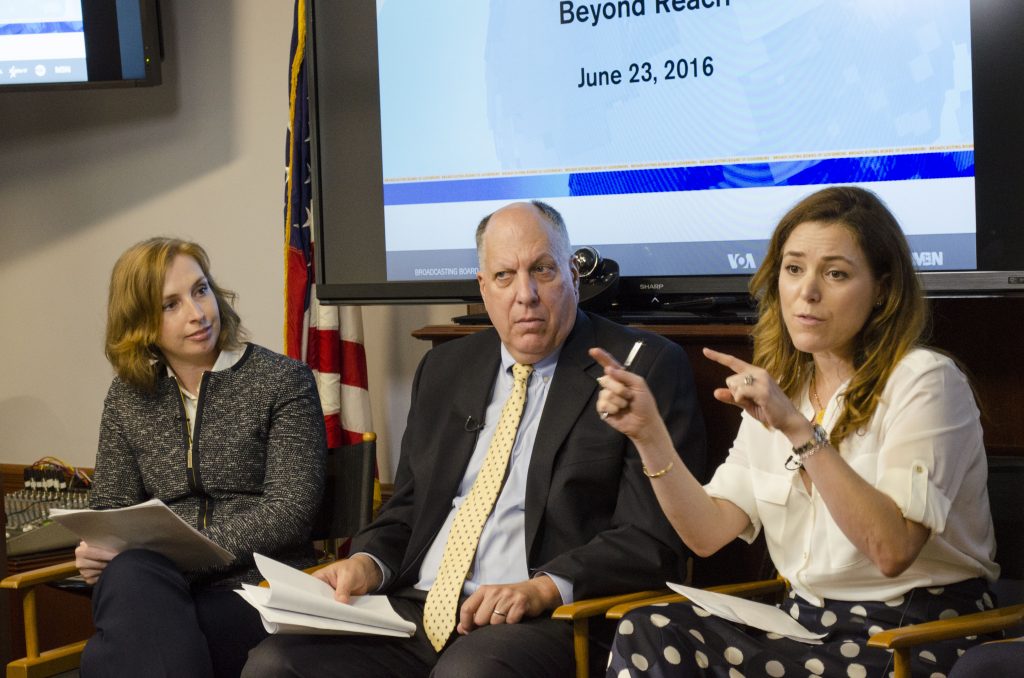BBG meeting focuses on networks’ delivery, measurement of impact
The Broadcasting Board of Governors met to receive status reports on important initiatives and to discuss BBG networks’ reach and impact with target audiences.
In a panel discussion moderated by CEO and Director John F. Lansing, representatives from each of the BBG networks gave examples of the specific ways they are achieving and measuring their impact with key overseas audiences.
“Impact is undoubtedly the driving force behind the diverse work we do at the BBG,” said Lansing. “No longer are audience numbers sufficient for measuring how successful we are. Instead, we can go much deeper and examine the true results of our great programming.”

A key theme that was derived from the panel discussion: BBG networks are achieving impact around the world and further growth is indeed possible.
Bay Fang, Radio Free Asia’s Managing Director for Northeast Asia, highlighted an RFA journalist’s reporting on sham hospitals set up by North Korean workers in Tanzania. The reporting was seen by South Korea’s ambassador to Tanzania, who alerted the country’s minister of health. The minister then shut the hospitals down.
Ernie Torriero, director of the Voice of America’s Extremism Watch Desk, talked about a Yazidi woman who was disfigured by a landmine while trying to escape ISIL. Because of a series of VOA stories on her plight, he said, people have stepped forward to help her get the medical treatment she needs.
Radio Free Europe/Radio Liberty’s Daisy Sindelar, regional director for Europe and a Russia specialist, shared an impact example from the RFE/RL-VOA jointly produced Russian-language news program Current Time. She said medical workers in a Russian industrial city appealed to President Vladimir Putin that they were receiving less than half of their monthly salary. After Russian officials said the mistake would be addressed, Current Time investigated and discovered that their pay had been raised by a small amount. Current Time posted a video on the story that received 630,000 views on social media and generated a national conversation about inadequate salaries.
Said Sindelar: “The really interesting thing for us is it took a conversation that was going on at a local level and turned it into a country-wide conversation. People were writing into Current Time and saying ‘the same thing is happening to me.’”
Another panelist, Nada Alwadi, the community manager for the Middle East Broadcasting Networks’ Raise Your Voice campaign to fight radicalism, spoke of her use of digital media to connect with audiences and provide a platform for them to discuss important issues. She said her live stream interview of a Saudi female activist on women’s issues in Saudi Arabia sparked many comments from people in the Middle East, some challenging what the woman was saying. She added that the discussion continued for about three days after the live stream.
The Office of Cuba Broadcasting’s Chief Content Officer Natalia Crujeiras shared an example of how a Martí report resulted in government action. She said coverage by a Martí journalist on more than 500 Cuban refugees stranded in a town in Colombia with no access to critical necessities prompted local authorities to provide basic items.
“So that to us is a good example of how because you follow a story and care and the audience trusts you, then you can influence other media and governments to take action,” Crujeiras said.
Prior to the panel, BBG Chairman Jeff Shell applauded the release of award-winning investigative journalist and RFE/RL contributor Khadija Ismayilova but urged authorities to clear her name. Her suspended sentence includes a five-year ban on traveling outside the country. He also urged authorities to immediately reopen RFE/RL’s bureau in Baku, which has been closed since December 2014.
“We want to recognize the assistance in support of Khadija from many outside organizations — Congress, the State Department, NGOs and others — who pressed her case in public and private,” Shell said. “The need for this support continues because Khadija isn’t truly free yet.”
Shell also cited a series of ongoing threats to BBG journalists around the world, including the nearly year-long imprisonment of RFE/RL’s correspondent in Turkmenistan, Saparmamed Nepeskuliev, and called for his immediate release.
In related business, the Board approved resolutions honoring the 65th anniversary of VOA’s Armenian Service, the 65th anniversary of VOA’s Georgian Service, the 20th anniversary of VOA’s Bosnian Service and the 15th anniversary of the Macedonian Unit of RFE/RL’s Balkan Service.
About the USAGM
The U.S. Agency for Global Media (USAGM), an independent international media organization overseen and funded by the US government, puts objective, professional news and information content to work on behalf of U.S. global interests and national security. USAGM networks include the Voice of America, Radio Free Europe/Radio Liberty, the Office of Cuba Broadcasting (Radio and TV Martí), Radio Free Asia, the Middle East Broadcasting Networks (Alhurra TV and Radio Sawa) and the Open Technology Fund. USAGM programming has a measured audience of 420 million in more than 100 countries and in 63 languages.
